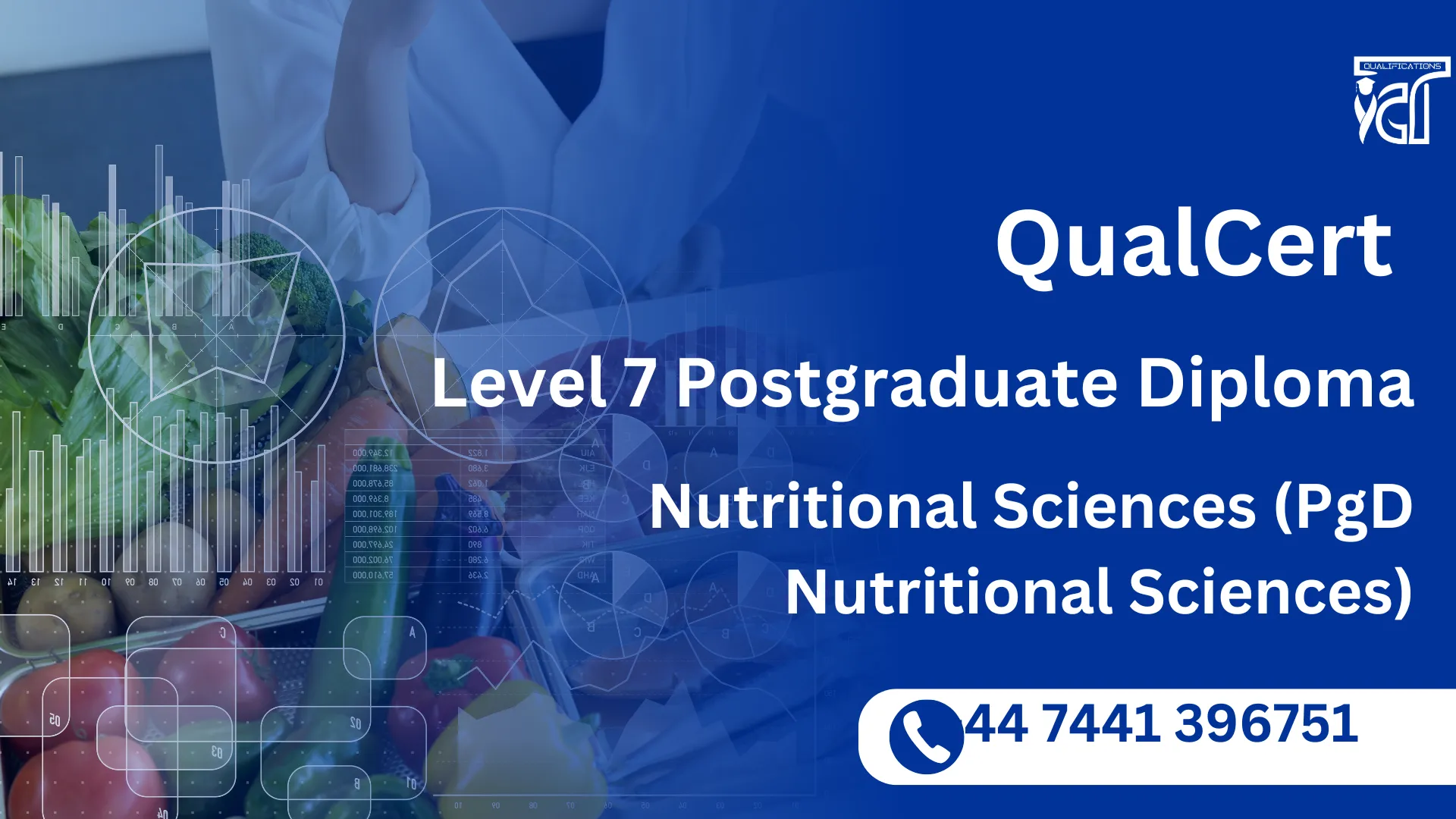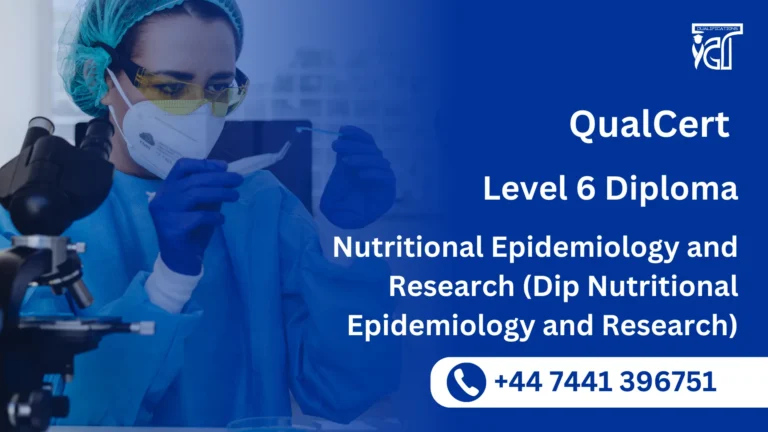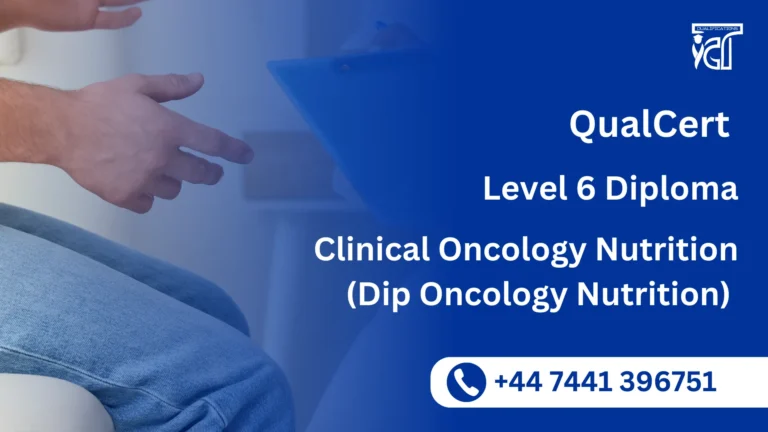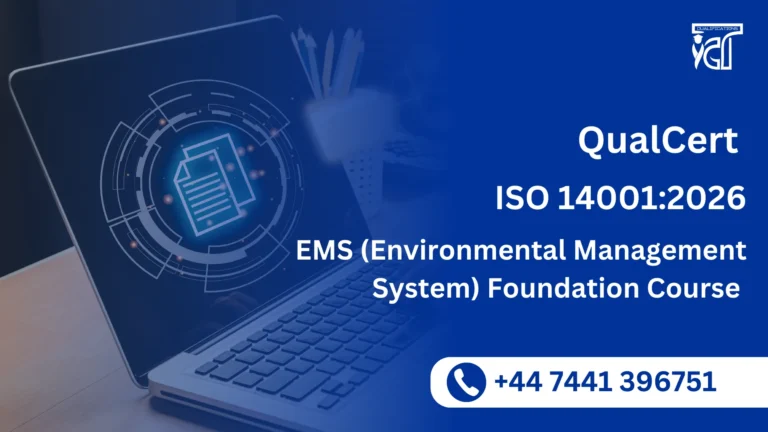The QualCert Level 7 Postgraduate Diploma in Nutritional Sciences is an advanced program designed to provide learners with a comprehensive understanding of nutrition from both scientific and applied perspectives. This qualification explores the biochemical, physiological, and public health dimensions of nutrition, equipping participants with the expertise to analyze dietary needs, evaluate nutritional interventions, and contribute to global health strategies.
QualCert Level 7 Postgraduate Diploma in Nutritional Sciences (PgD Nutritional Sciences) covers essential areas such as macronutrients and micronutrients, metabolism, nutritional biochemistry, diet-related diseases, and the role of nutrition in health promotion and disease prevention. Learners will also examine contemporary issues including food sustainability, nutritional epidemiology, and the impact of nutrition on population health.
Through case studies, applied projects, and research-focused modules, participants will develop advanced skills in nutritional assessment, intervention planning, and policy analysis. The program emphasizes evidence-based practice, critical thinking, and innovation, preparing learners to address complex nutritional challenges in diverse contexts.
Ultimately, this diploma empowers learners to become specialists capable of advancing nutritional science, guiding public health initiatives, and influencing food and health policies. With its international recognition and advanced focus, the PgD Nutritional Sciences serves as a pathway to leadership roles in healthcare, nutrition consultancy, food industries, and academic research, while contributing to the global demand for sustainable and effective nutrition solutions.
QualCert Level 7 Postgraduate Diploma in Nutritional Sciences (PgD Nutritional Sciences)
The QualCert Level 7 Postgraduate Diploma in Nutritional Sciences (PgD Nutritional Sciences), offers 120 Credits, requiring a Total Qualification Time (TQT) of 1200 hours, including 600 Guided Learning Hours (GLH).
| Unit Ref# | Unit Title | Credit | GLH | TQT |
| QC29124- 1 | Advanced Nutritional Biochemistry | 20 | 100 | 200 |
| QC29124-2 | Nutritional Physiology and Metabolism | 20 | 100 | 200 |
| QC29124-3 | Diet, Disease and Preventive Nutrition | 20 | 100 | 200 |
| QC29124-4 | Food Science, Safety and Innovation | 20 | 100 | 200 |
| QC29124-5 | Research Methods in Nutritional Sciences | 20 | 100 | 200 |
| QC29124-6 | Dissertation / Applied Research Project in Nutritional Sciences | 20 | 100 | 200 |
GLH (Guided Learning Hours) and TQT (Total Qualification Time) are terms commonly used in vocational qualifications to help define the amount of time a learner is expected to spend on their studies.
1. GLH (Guided Learning Hours)
GLH refers to the number of hours a learner spends being directly taught, supervised, or supported during their course. This includes the time spent in activities such as:
- Classroom instruction
- Practical workshops
- One-on-one tutoring or mentoring sessions
- Online learning sessions with tutor support
In other words, GLH represents the time that learners are actively engaged with their instructors or learning activities.
2. TQT (Total Qualification Time)
TQT represents the total amount of time a learner is expected to invest in completing a qualification, including:
- GLH (Guided Learning Hours): Time spent on direct learning, as explained above.
- Self-Directed Learning: This includes time spent on independent study, research, assignment completion, preparation for exams, and any other work the learner does outside of direct teaching hours.
TQT is a broader measure that includes all the time required to achieve the qualification. It helps learners and employers understand the overall commitment required for the qualification.
Key Differences Between GLH and TQT:
- GLH focuses on direct learning with guidance or supervision.
- TQT includes GLH as well as independent study time and other learning-related activities.
Example:
If a qualification has a TQT of 600 hours and a GLH of 250 hours, it means the learner should spend 250 hours in direct learning (classroom, online, or tutor-led sessions) and 350 hours on independent study or research.
Learning Outcomes for the QualCert Level 7 Postgraduate Diploma in Nutritional Sciences (PgD Nutritional Sciences):
Advanced Nutritional Biochemistry
- Critically analyse the biochemical processes underlying human nutrition
- Evaluate the role of macronutrients and micronutrients in metabolic pathways
- Examine nutrient interactions and their effects on health and disease
- Apply biochemical knowledge to develop evidence-based nutritional strategies
Nutritional Physiology and Metabolism
- Assess human physiological processes related to energy balance and metabolism
- Critically evaluate how diet influences metabolic health and chronic disease
- Analyse the physiological responses to nutritional interventions
- Apply advanced physiological knowledge to support clinical and public health practice
Diet, Disease and Preventive Nutrition
- Examine the relationships between diet, disease risk, and health outcomes
- Develop evidence-based dietary interventions for disease prevention and management
- Critically evaluate epidemiological and clinical research in nutrition
- Apply nutritional science to support population health and wellbeing
Food Science, Safety and Innovation
- Understand food composition, processing, and safety standards
- Evaluate innovative approaches in functional foods and nutritional products
- Assess the impact of food technology on health and dietary patterns
- Apply scientific principles to improve food quality and safety in practice
Research Methods in Nutritional Sciences
- Apply advanced qualitative and quantitative research methods in nutrition
- Critically review and interpret scientific literature
- Design and implement ethical research studies in nutritional sciences
- Analyse and present data to support evidence-based practice and decision-making
Dissertation / Applied Research Project in Nutritional Sciences
- Conduct independent, postgraduate-level research in nutritional sciences
- Demonstrate advanced problem-solving and critical thinking skills
- Apply research findings to practical and theoretical contexts
- Produce a comprehensive dissertation with actionable recommendations for policy, practice, or further research
This advanced diploma provides learners with the scientific knowledge, analytical skills, and professional recognition needed to excel in the field of nutrition and public health. It is designed to strengthen expertise, enhance career prospects, and empower participants to contribute meaningfully to global health and nutrition strategies.
Enhanced Knowledge and Expertise
- Gain advanced understanding of macronutrients, micronutrients, metabolism, and nutritional biochemistry
- Learn evidence-based approaches to dietary assessment, intervention planning, and policy analysis
- Explore contemporary issues such as food sustainability, nutritional epidemiology, and diet-related diseases
- Develop expertise in applying nutritional science to diverse populations and health contexts
Practical Application and Skills Development
- Apply theoretical knowledge through case studies, applied projects, and research-focused modules
- Strengthen analytical and critical thinking skills for complex nutritional challenges
- Acquire competencies in designing, evaluating, and implementing nutrition interventions
- Build confidence in translating scientific research into practical solutions for healthcare and food industries
Career Advancement Opportunities
- Progress to senior roles in healthcare, nutrition consultancy, food industries, and public health organizations
- Enhance employability in NGOs, government agencies, and international health initiatives
- Position yourself as a specialist capable of influencing food and health policies
- Use this internationally recognized qualification as a pathway to doctoral studies or advanced certifications
Contribution to Society and Global Impact
- Play a vital role in promoting healthier lifestyles and preventing diet-related diseases
- Contribute to sustainable nutrition strategies that address global health challenges
- Influence public health initiatives and advocate for evidence-based nutrition practices
- Empower communities by supporting access to safe, effective, and sustainable nutrition solutions
This program is designed for individuals who are passionate about advancing their expertise in nutrition, health, and food science. The ideal learner is someone motivated to apply evidence-based nutritional knowledge to improve health outcomes, influence policy, and contribute to sustainable food systems.
Learners Seeking Advanced Knowledge and Expertise
- Individuals with a background in nutrition, dietetics, food science, health sciences, or related fields
- Those eager to explore nutritional biochemistry, metabolism, diet-related diseases, and public health nutrition in depth
- Learners motivated to understand the role of nutrition in disease prevention, health promotion, and sustainability
- Candidates who value evidence-based approaches and critical thinking in nutritional science
Learners Focused on Practical Application and Skills Development
- Professionals aiming to apply theory through case studies, nutritional assessments, and applied research projects
- Those interested in strengthening analytical and problem-solving skills for complex nutritional challenges
- Learners who want to develop competencies in designing, evaluating, and implementing nutrition interventions
- Participants seeking confidence in translating scientific research into practical solutions for healthcare and food industries
Learners Aspiring for Career Advancement
- Nutrition consultants, dietitians, healthcare professionals, and food industry specialists aiming for leadership roles
- Individuals seeking career progression in NGOs, government agencies, international health organizations, or academia
- Learners who want to position themselves as specialists capable of influencing food and health policies
- Candidates looking to use this internationally recognized qualification as a pathway to doctoral studies or advanced certifications
Learners Committed to Societal Contribution and Global Impact
- Those passionate about promoting healthier lifestyles and preventing diet-related diseases
- Learners motivated to contribute to sustainable nutrition strategies that address global health challenges
- Individuals who want to influence public health initiatives and advocate for evidence-based nutrition practices
Completing the QualCert Level 7 Postgraduate Diploma in Nutritional Sciences opens multiple pathways for learners to advance academically, professionally, and in research. This qualification is designed to serve as both a specialized credential and a foundation for higher-level opportunities in nutrition, health sciences, and food policy.
Academic Progression
- Eligibility to pursue Level 8 qualifications such as doctoral studies or advanced research programs in nutrition, dietetics, or public health
- Pathways to specialized certifications in clinical nutrition, sports nutrition, food policy, and nutritional epidemiology
- Opportunities to contribute to scholarly publications, conferences, and international collaborations in nutritional sciences
- Access to advanced academic networks in healthcare, food science, and public health research
Professional Advancement
- Progression to senior roles in healthcare, nutrition consultancy, food industries, and public health organizations
- Opportunities to work with NGOs, government agencies, and international health initiatives focused on nutrition and wellness
- Enhanced career prospects in policy development, nutritional program management, and sustainable food systems
- Recognition as a specialist capable of leading initiatives that improve population health through evidence-based nutrition strategies
Research and Development Opportunities
- Engagement in applied research projects exploring diet-related diseases, nutritional biochemistry, and sustainable food practices
- Contribution to evidence-based practices in nutritional assessment, intervention planning, and health promotion
- Development of new frameworks for population health nutrition and chronic disease prevention
- Collaboration with universities, research centers, and international organizations on global nutrition challenges
Societal Impact and Leadership
- Ability to influence public health policies and advocate for sustainable nutrition strategies
- Contribution to designing community programs that promote healthier lifestyles and prevent diet-related diseases
- Leadership in shaping international strategies for nutrition education, food sustainability, and public health promotion
Entry Requirements
Entry Requirements for the QualCert Level 7 Postgraduate Diploma in Nutritional Sciences (PgD Nutritional Sciences):
- Age: Learners must be at least 21 years old at the start of the programme.
- Education: Completion of a Level 6 qualification (or equivalent) in nutrition, dietetics, food science, health sciences, biology, chemistry, or a related discipline. Alternatively, substantial professional experience in nutrition, healthcare, or food-related industries may be considered in place of formal qualifications
- Work Experience: A minimum of 2–3 years of relevant work experience in nutrition consultancy, dietetics, food technology, healthcare, or public health services.
- English Proficiency: Competence in English or the language of instruction, typically at CEFR Level B2 or equivalent. Ability to read, write, and communicate effectively in academic and professional contexts.
Register Now
Qualification Process
Qualification Process for the QualCert Level 7 Postgraduate Diploma in Nutritional Sciences (PgD Nutritional Sciences)
- Self-Assessment:
Begin by evaluating your eligibility to ensure you meet the qualification requirements, including work experience, knowledge, and language proficiency. - Registration:
Complete your registration by submitting the required documents, including a scanned copy of a valid ID, and paying the registration fee. - Induction:
An assessor will conduct an induction to confirm your eligibility for the course and explain the evidence requirements. If you do not meet the criteria, your registration will be canceled, and the fee will be refunded. - Assignmnets & Evidence Submission:
Provide all assignmnets and the necessary evidence based on the assessment criteria outlined in the course. If you are unsure of the required evidence, consult with the assessor for guidance on the type and nature of evidence needed. - Feedback and Revision:
The assessor will review your submitted evidence and provide feedback. Evidence that meets the criteria will be marked as “Criteria Met,” while any gaps will be identified. You will be asked to revise and resubmit if needed. - Competence Evidence:
Submit final evidence demonstrating that all learning outcomes have been met. This evidence will be marked as “Criteria Met” by the assessor once it is satisfactory. - Internal Quality Assurance (IQA):
The Internal Quality Assurance Verifier (IQA) will review your evidence to ensure consistency, quality, and compliance with standards. - External Verification:
The IQA will submit your portfolio to QualCert External Quality Assurance Verifiers (EQA) for final confirmation. The EQA may contact you directly to verify the authenticity of your evidence. - Certification:
Upon successful completion of all checks, QualCert will issue your official certificate, confirming that you have attained the QualCert Level 7 Postgraduate Diploma in Nutritional Sciences (PgD Nutritional Sciences).







